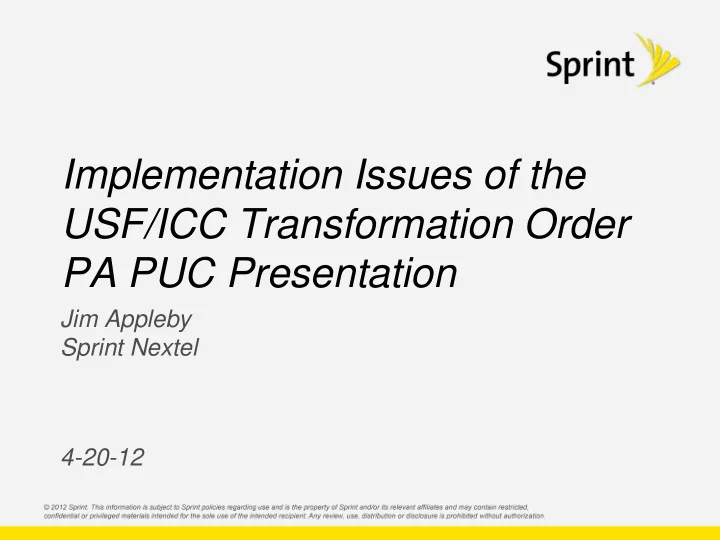

Implementation Issues of the USF/ICC Transformation Order PA PUC Presentation Jim Appleby Sprint Nextel 4-20-12
Topics • LEC Access Tariff Filings (7-1-12) • Interconnection Agreement (ICA) Implementation Issues > VoIP-PSTN traffic > Wireless Intra-MTA Traffic > Rural Transport Exemption 2
LEC Access Tariff Submissions (7-1-12) • It is essential that the PAPUC mandate that ILECs provide supporting data to permit the Commission, Staff and interested access payers a thorough review in advance of the actual tariff filing > Supporting Data should be produced by 5-15-12 > Data collected supports FCC’s role in establishment of ARCs and CAF support > Data needed: – fiscal year 2011 (10-1-10 to 9-30-11) intrastate demand by element – Intrastate and interstate access rates by element at 12-29-11 – If ILECs intrastate transport rate structure is different than its interstate transport rate structure: Will the ILEC set its rate structure equal on 7-1-12 or wait until 7-1-13? Quantification of the revenues that will be generated by the new transport rate structure when rates equal interstate levels on 7-1-13 (proposed method on the next page) 3
Suggested Intrastate Transport Rate Restructure Methodology • Calculate the total annual intrastate transport revenues under the existing rate structure (current rates times fiscal year demand) • Determine the intrastate demand for all the rate elements in the new structure > For MOU rate elements - ratio of interstate local switching minutes to interstate transport element demand applied to intrastate local switching minutes > For dedicated transport rates – interstate demand divided by the PIU then multiply that result by (1-PIU) to get the intrastate demand quantities • Apply 12-29-11 interstate rates by element to the intrastate demand derived in previous step. The total for all rate elements equals the revenue to be derived from the new transport rate structure • Whether an ILEC is changing its intrastate transport rate structure on 7-1-12 or not, the intrastate transport rates must be reduced by the equivalent of 50% of the revenue difference between existing and the future rate structures 4
Rate Reductions Should Be Competitively Neutral • Disproportionate changes to individual rate elements on 7-1-12 can advantage some access payers at the expense of other payers • For example: if all access rate reductions are taken on minute of use transport elements and none to dedicated transport, access payers of dedicated transport will not realize their fair share of the access rate reductions • Rate changes should be competitively neutral and lead to mirroring of interstate access rates and rate structure on 7-1-13 • Intrastate access rates capped by the USF/ICC Transformation Order must remain capped until the rate transition mandates reductions in those rates > Price cap ILECs – originating and terminating rates > Rate of Return ILECs – terminating rates 5
Interconnection Contracts • USF/ICC Transformation Order impacts interconnection contracts in three key areas: > Sets compensation cap on a prospective basis for traffic exchanged in TDM format that originates or terminates in VoIP format > All traffic exchanged with a wireless carrier within an MTA is subject to reciprocal bill and keep compensation > Rural Transport Exemption – The cost obligation of transporting intraMTA traffic originated by a Rate of Return ILEC customer destined for a wireless carrier subscriber outside the Rate of Return ILEC’s local service territory shifts to the wireless carrier 6
ICA Issues – VoIP • Any VoIP provisions in existing contracts may need to be updated to reflect the USF/ICC Transformation Order’s ruling on VoIP compensation • Unless other agreements are reached in ICA, default is: > VoIP-PSTN toll tariff applies to VoIP originated or terminated toll traffic > Reciprocal compensation rates apply to non-toll VoIP originated or terminated traffic > Commission to review VoIP-PSTN tariffs submitted by LECs • To the extent parties can not agree in ICA, the PAPUC will need to resolve any disputes 7
ICA Issues – Traffic Exchanged with a Wireless Carrier Within an MTA Subject to Bill and Keep • If no interconnection contract existed between the LEC and wireless provider on 12-29-11, bill and keep continues • If an agreement existed on 12-29-11 and traffic not exchanged at bill and keep, the FCC modified its original order to have bill and keep start 7-1-12 • Existing interconnection contracts may need to be revised to reflect this ruling • To the extent parties can not agree how to incorporate the order, the PAPUC will need to resolve any disputes 8
ICA Issues – Rural Transport Exemption • USF/ICC Transformation Order ruled Federal Rate of Return ILECs are not responsible for the cost of transporting intraMTA traffic destined for wireless carriers beyond the RLEC local service territory • Interconnecting CMRS carrier should cover those costs as long as: > The rural LEC and the CMRS carrier have an ICA describing this arrangement > The rural LEC can demonstrate it actually incurred a cost (paid for transport charges beyond its service territory) > Lowest cost option should be employed to route the traffic 9
States Role in Dispute Resolution • As long as carriers must interconnect their networks while competing against one another, interconnection negotiations will always be adversarial • A regulatory backstop is necessary in the event the carrier to carrier negotiations fail • The PAPUC still has a key role to play in resolving disputes that arise in: > Interconnection Agreements > Intercarrier Compensation (Implementation of the Rate Transition) 10
Recommend
More recommend